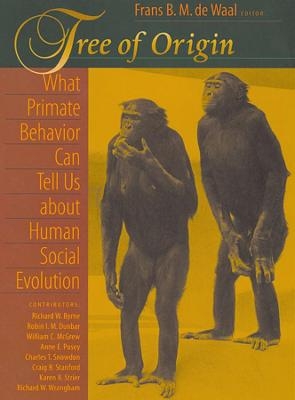
Tree of Origin
Harvard University Press (Verlag)
978-0-674-01004-8 (ISBN)
How did we become the linguistic, cultured, and hugely successful apes that we are? Our closest relatives--the other mentally complex and socially skilled primates--offer tantalizing clues. In Tree of Origin nine of the world's top primate experts read these clues and compose the most extensive picture to date of what the behavior of monkeys and apes can tell us about our own evolution as a species.
It has been nearly fifteen years since a single volume addressed the issue of human evolution from a primate perspective, and in that time we have witnessed explosive growth in research on the subject. Tree of Origin gives us the latest news about bonobos, the "make love not war" apes who behave so dramatically unlike chimpanzees. We learn about the tool traditions and social customs that set each ape community apart. We see how DNA analysis is revolutionizing our understanding of paternity, intergroup migration, and reproductive success. And we confront intriguing discoveries about primate hunting behavior, politics, cognition, diet, and the evolution of language and intelligence that challenge claims of human uniqueness in new and subtle ways.
Tree of Origin provides the clearest glimpse yet of the apelike ancestor who left the forest and began the long journey toward modern humanity.
Frans B. M. de Waal is C. H. Candler Professor of Primate Behavior in the Psychology Department and Director of Living Links, part of the Yerkes Primate Center, Emory University. Robin Dunbar is Professor of Evolutionary Anthropology and Director of the Institute of Cognitive & Evolutionary Anthropology at the University of Oxford. William C. McGrew is Professor of Anthropology and Zoology at Miami University, Ohio. Craig Stanford is Professor of Biological Sciences and Anthropology at the University of Southern California. Karen B. Strier is Professor of Anthropology at the University of Wisconsin-Madison. Richard W. Wrangham is Ruth B. Moore Professor of Biological Anthropology in the Department of Human Evolutionary Biology at Harvard University.
Frans B. M. de Waal Introduction 1. Anne E. Pusey Of Genes and Apes: Chimpanzee Social Organization and Reproduction 2. Frans B. M. de Waal Apes from Venus: Bonobos and Human Social Evolution 3. Karen B. Strier Beyond the Apes: Reasons to Consider the Entire Primate Order 4. Craig S. Stanford The Ape's Gift: Meat-eating, Meat-sharing, and Human Evolution 5. Richard W. Wrangham Out of the Pan, Into the Fire: How Our Ancestors' Evolution Depended on What They Ate 6 Richard W. Byrne Social and Technical Forms of Primate Intelligence 7. Robin I. M. Dunbar Brains on Two Legs: Group Size and the Evolution of Intelligence 8. Charles T. Snowdon From Primate Communication to Human Language 9. William C. McGrew The Nature of Culture: Prospects and Pitfalls of Cultural Primatology Notes
| Erscheint lt. Verlag | 14.11.2002 |
|---|---|
| Co-Autor | Richard Byrne, Robin Dunbar, W. C. McGrew, Anne Pusey |
| Zusatzinfo | 37 halftones, 19 line illustrations, 4 tables |
| Verlagsort | Cambridge, Mass |
| Sprache | englisch |
| Maße | 147 x 229 mm |
| Gewicht | 499 g |
| Themenwelt | Naturwissenschaften ► Biologie ► Evolution |
| Naturwissenschaften ► Biologie ► Zoologie | |
| ISBN-10 | 0-674-01004-3 / 0674010043 |
| ISBN-13 | 978-0-674-01004-8 / 9780674010048 |
| Zustand | Neuware |
| Informationen gemäß Produktsicherheitsverordnung (GPSR) | |
| Haben Sie eine Frage zum Produkt? |
aus dem Bereich


